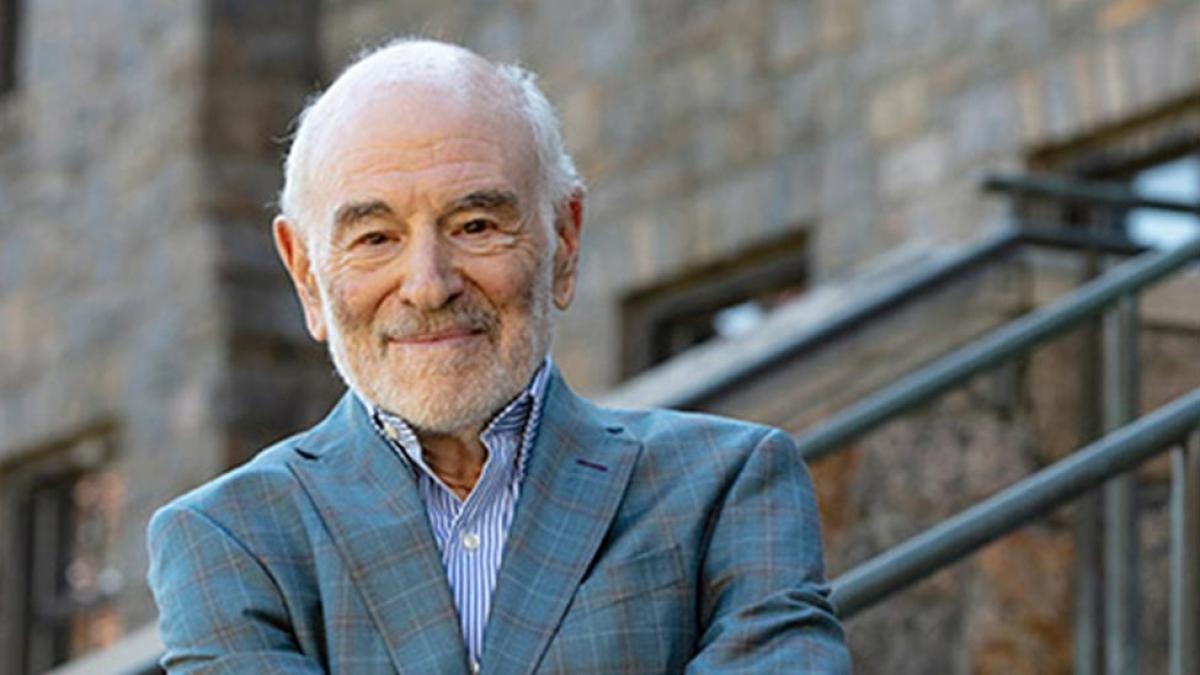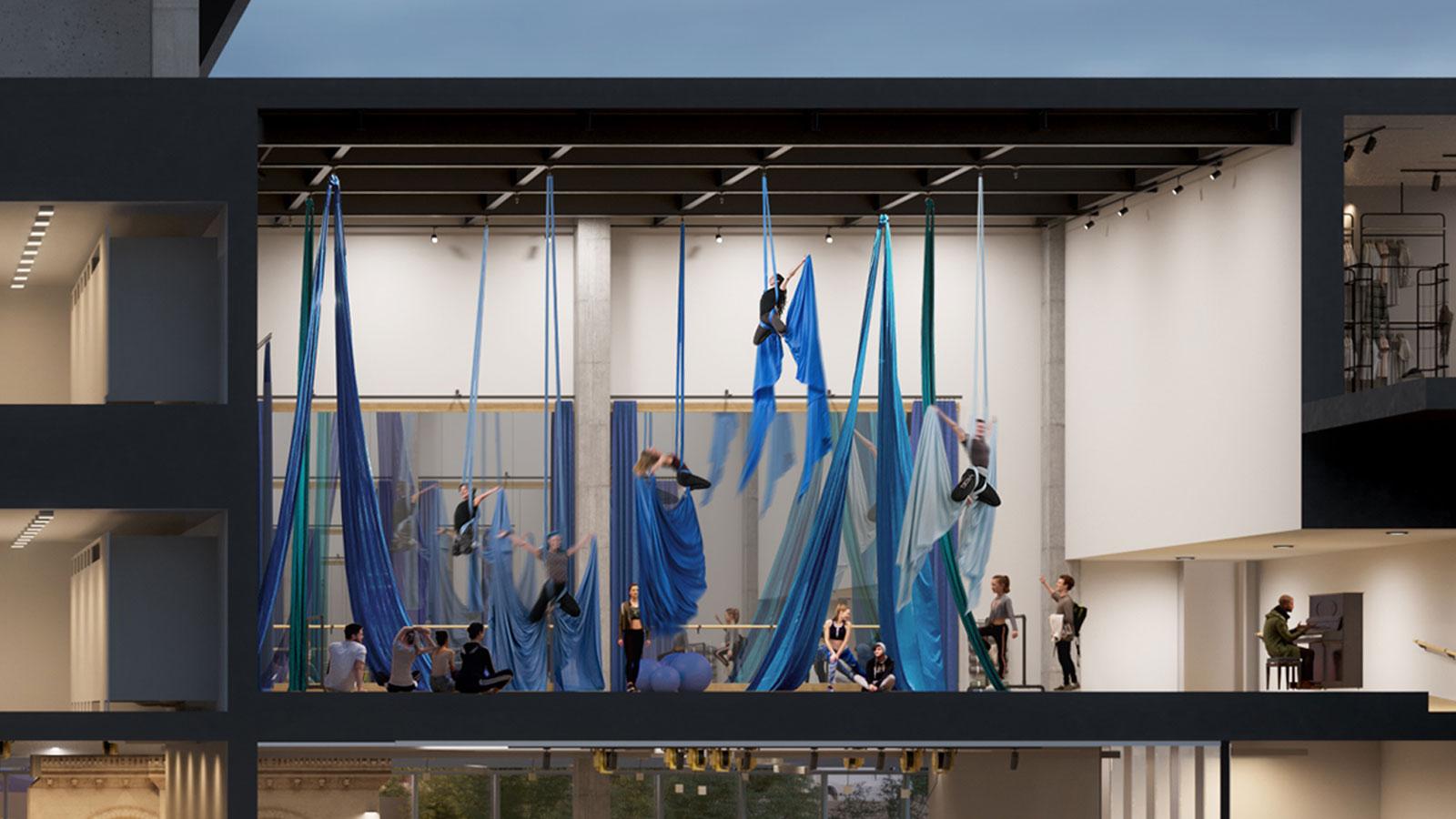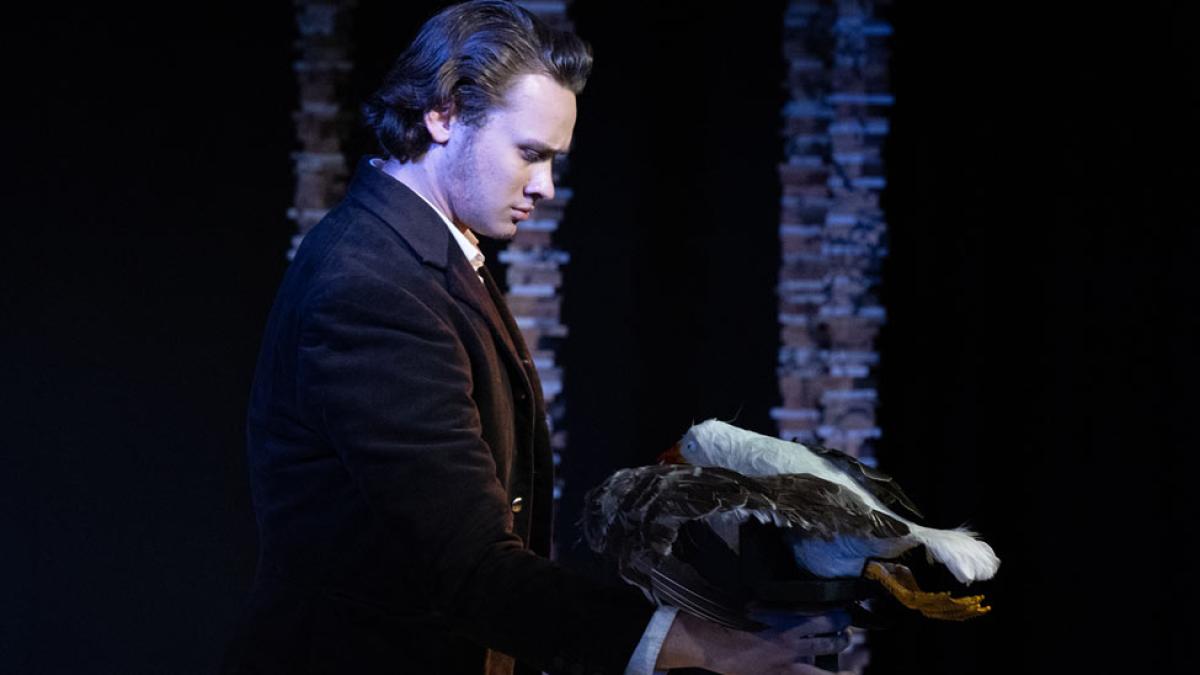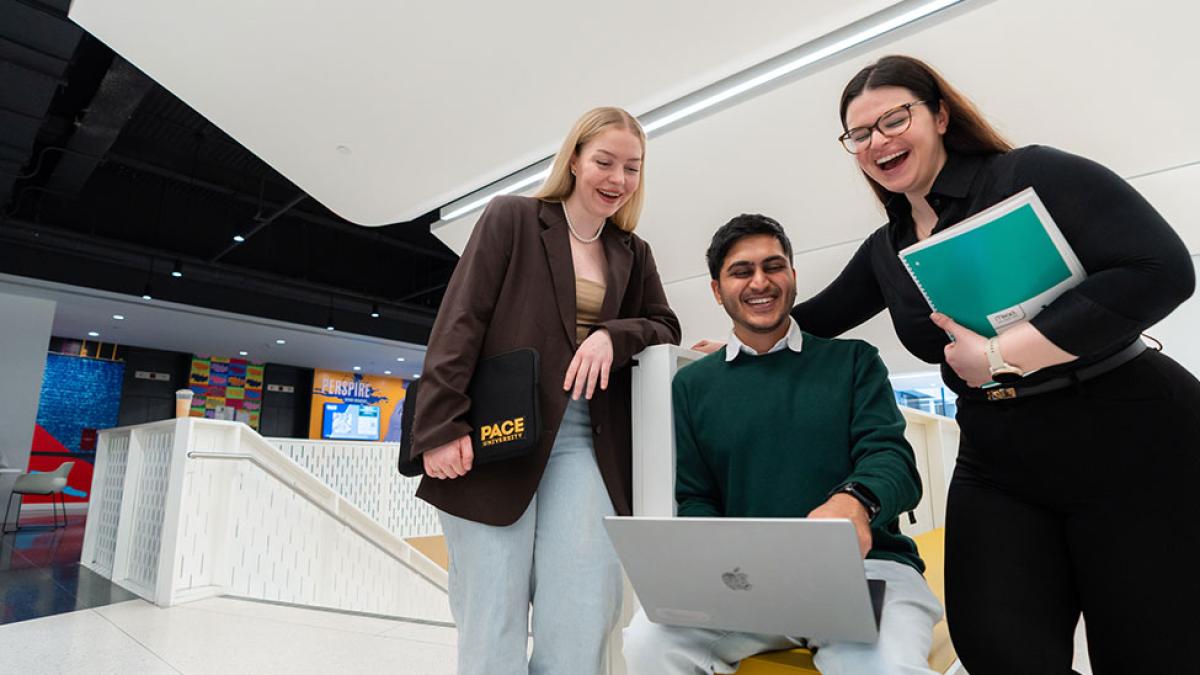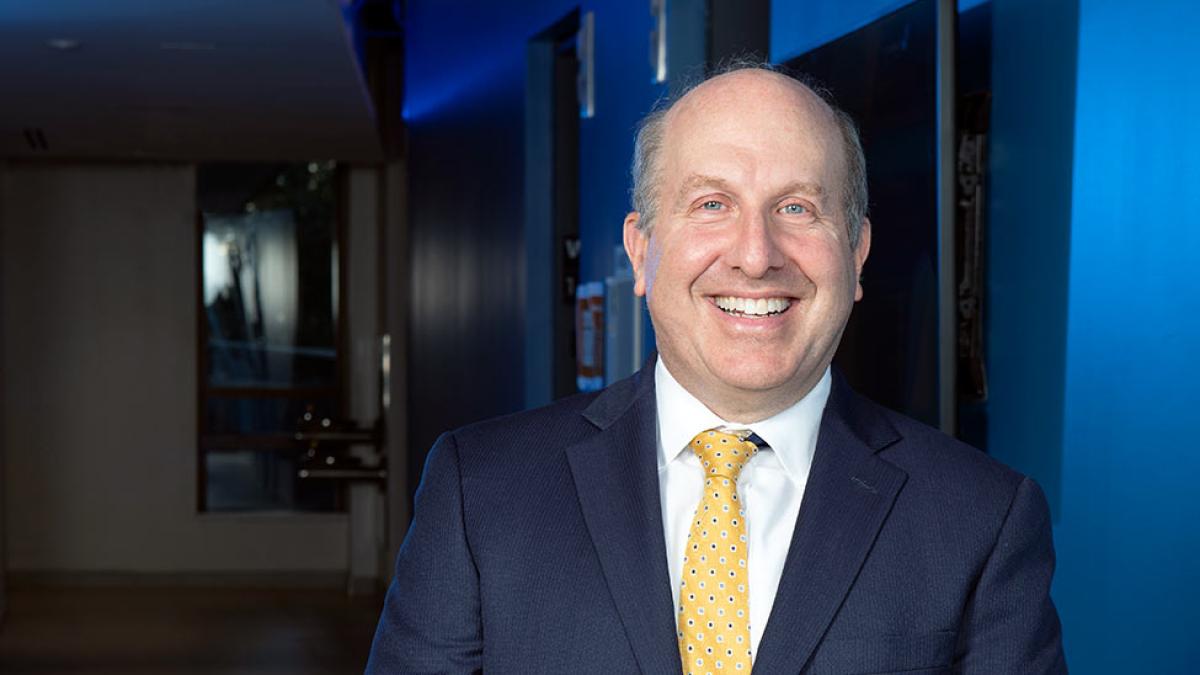Pace’s Sands College of Performing Arts and Deaf West Theatre are joining forces to make music education more inclusive. Their new artist-in-residence program introduces the first-ever ASL Music Theory Lexicon Project—giving deaf and hard-of-hearing artists equal access to the language of music while training all students to see access as innovation.
Your Backstage Pass to the Future of Pace
The future of the arts at Pace is under construction. Inside One Pace Plaza East, Sands College of Performing Arts students and faculty are preparing to create, collaborate, and perform in spaces built for bold ideas and bright lights.


Inside the construction at One Pace Plaza East, you can already feel the momentum. The sparks, the steel, the sound of something big taking shape: this is where the future of the arts at Pace begins.
Opening in fall 2026, the new creative home of the Sands College of Performing Arts is being purpose-built for imagination in motion. It’s where classroom learning meets the energy of downtown New York City and where tomorrow’s stars find their spotlight.
At its heart is a state-of-the-art performing arts center featuring three dynamic new venues. The reimagined Schimmel Theater—430 seats filled with the next generation of Broadway fans—is where tomorrow’s Broadway stars rehearse today. The black box theater turns “what if…” into standing ovations, and the indoor-outdoor garden theater breaks the fourth wall (literally!), opening to the courtyard for boundary-pushing performances that blur art and audience.
"The renovation of the Performing Arts Center at One Pace Plaza East marks a transformative moment for Sands College and for downtown New York City. With three state-of-the-art theaters, an accessible lighting grid, expansive dance and acting studios, and world-class production spaces, we are creating a hub where innovation meets inclusion," says Jennifer Holmes, PhD, Dean of the Sands College of Performing Arts.
Dive Into the Details of One Pace Plaza East
Just steps away, Pace students build entire worlds in the scene shop, design behind-the-curtain couture in the costume shop, and reach new heights in aerial dance studios where, let’s be honest, when Doja Cat needs dancers, she calls Pace.
And because creativity needs fuel, there’s even a café where group projects turn into coffee dates and pre-show nerves meet caffeine and camaraderie. Plus, this space will double as a concession stand once opening night comes.
But this transformation is bigger than what’s onstage. With all-electric infrastructure, innovative design, and revitalized student housing in Maria’s Tower, One Pace Plaza East is built for sustainability, collaboration, and community.
"This center will anchor a new arts corridor in Lower Manhattan—revitalizing our community, showcasing extraordinary talent, and offering audiences access to groundbreaking, affordable performances," Holmes continues. "We are proud to build a home that reflects the imagination, artistry, and ambition of our students, faculty, and guest artists."
When the doors open, students will step into a space made not just for movement but for momentum. The next act of Pace University’s story begins here—bold, electric, and ready for its close-up.
More from Pace
What does it take to bring a classic to life? From first table read to final curtain call, follow along with the cast and crew of Chekhov’s The Seagull as they navigate an accelerated rehearsal process, build a world from scratch, and discover what it means to perform like professionals.
Meet the actors, dancers, and designers redefining what it means to be a working artist in New York. From Broadway bows to lighting up Spike Lee films, at Pace’s Sands College, the line between student and professional blurs, and the city itself becomes the classroom, stage, and screen.
Championing Environmental Action Through Storytelling: Q+A with Taylor Ganis '23
Inspired by her combined undergraduate and graduate studies at Pace, Environmental Studies and Science alumna Taylor Ganis is a children’s book author and founder of a top environmental podcast.


Taylor Ganis
Class of 2023
Environmental Studies, BA/Environmental Science and Policy, MS
You are the author of an environmental children’s book, Greeny La-Roo and the Earth Crew. What inspired you to write this book and what do you hope readers will glean from it?
During my time working as a naturalist for Westchester County Parks at Lenoir Preserve, I had the privilege of teaching children about the environment and the importance of protecting it. I quickly noticed that many existing children’s books with environmental themes focused on awareness, but not on action. As someone who believes deeply in empowering others to make a difference, I wanted to create a story that not only educated young readers but also inspired them to do something. To feel that they could be heroes for the planet, too.
That realization sparked Greeny La-Roo and the Earth Crew, designed to blend imagination, fun, and real-world impact. My hope is that children come away from the story feeling excited, capable, and ready to take small but meaningful actions to care for our Earth.

You graduated from Pace with a combined Environmental Studies, BA/Environmental Science and Policy, MS. How did your studies inspire and prepare you for authoring this book?
My studies were instrumental to the subject matter in the book. I’ve always loved spending time outdoors, but it wasn’t until I began my academic journey at Pace that I truly understood how the places I cherished and the wildlife I was passionate about protecting were being impacted by a changing climate. Through my coursework in environmental studies and environmental science and policy, I gained a deeper awareness of the challenges facing our planet and the interconnectedness between people, nature, and policy. My studies not only provided the scientific foundation for Greeny La-Roo and the Earth Crew but also strengthened my lifelong mission to protect the planet for current and future generations.
You also host a podcast called The Hopeful Environmentalist. Please tell us more about that.
I started The Hopeful Environmentalist (THE) podcast in my college apartment while pursuing my master’s degree at Pace. At the time, I was overwhelmed by the constant stream of bad news about our changing climate and its impacts on people, animals, and the planet. I craved a space that focused on hope, the kind that inspires action instead of despair. As I dove deeper, I realized that while science and policy are essential to solving the climate crisis, they’re often not translated in ways the public can easily understand. So, I created THE to bridge that gap.
Today, the podcast, rated top 11 best environmental podcast in 2023, has listeners in over 35 countries. You can listen to it anywhere you stream podcasts/music.
In addition to being an author, what has your career trajectory been like since graduation?
After finishing my degree, I moved to Washington, DC, to intern at the White House Council on Environmental Quality under the Biden-Harris Administration. I then relocated to North Dakota, where I worked as a contractor for the National Oceanic and Atmospheric Administration on environmental policy, while also a social media assistant, podcast editor, and ultimately, communications coordinator for Our Climate. I soon realized how much I wanted to deepen my skills in storytelling and communication—so I began focusing on THE podcast. Through it, I’ve had the privilege of being invited to speak at the United Nations Conference on Biological Diversity and the UK Mission to the UN, as well as receiving media badges at EarthX’s Congress of Conferences and Climate Week NYC.
Next, I joined the Pace University Gale Epstein Center, where I currently work part-time on water policy initiatives, in addition to as a full-time social media coordinator at Vocal Media.
Through my coursework in environmental studies and environmental science and policy at Pace, I gained a deeper awareness of the challenges facing our planet and the interconnectedness between people, nature, and policy.
Why did you choose to attend Pace?
I was looking for a university that would not only provide a strong academic foundation but also offer opportunities to gain real-world experience and connect with organizations making a difference. The decision to attend Pace proved to be one of the best I’ve made. I gained practical experience in everything from field data collection to conducting informational interviews, and those experiences ultimately helped me earn an internship at the White House Council on Environmental Quality and has set my career in motion.
What activities and organizations were you involved with as a student?
I served as president of the NATURE Club, where I worked alongside a passionate group of students to create hands-on environmental experiences for the Pace community. We organized campus clean-up days, sustainability-focused events, and off-campus trips, including a memorable visit to the Wolf Conservation Center, to give students unique opportunities to connect with conservation organizations. Beyond the NATURE Club, I participated in the Environmental Studies and Science department’s Career Day, which introduced me to mentors and internship opportunities that helped shape the foundation of my career.
What were your experiences like in the Environmental Studies and Science department on the Pleasantville campus? What faculty had been instrumental in your journey as a student?
I truly loved my time in the Environmental Studies and Science department. Every professor I had played a role in shaping the environmentalist I am today by opening doors to opportunities I might never have discovered on my own. However, two professors who had the greatest impact on my journey were Professor John Cronin and Professor Michelle Land. Through their classes and mentorship, I gained a deeper understanding of the policy and advocacy side of the environmental field, a perspective that ultimately helped me secure an internship at the White House Council on Environmental Quality. Their dedication to student success went far beyond the classroom, from organizing mock hearings to helping us build meaningful networks.
What advice would you give to our students, as they navigate college life?
Define your own path and stay open to where it may lead. Also, talk to your professors. Their mentorship and stories can open doors you didn’t even know existed. Further, take classes outside your major, explore topics that spark your curiosity, and seek experiences that fuel your passions, not just your resume. Most importantly, enjoy the process. College isn’t just about preparing for your career, it’s also about discovering who you are, what you care about, and what kind of impact you want to make.
Signing the Future of Musical Theater
Pace’s Sands College of Performing Arts and Deaf West Theatre are joining forces to make music education more inclusive. Their new artist-in-residence program introduces the first-ever ASL Music Theory Lexicon Project—giving deaf and hard-of-hearing artists equal access to the language of music while training all students to see access as innovation.
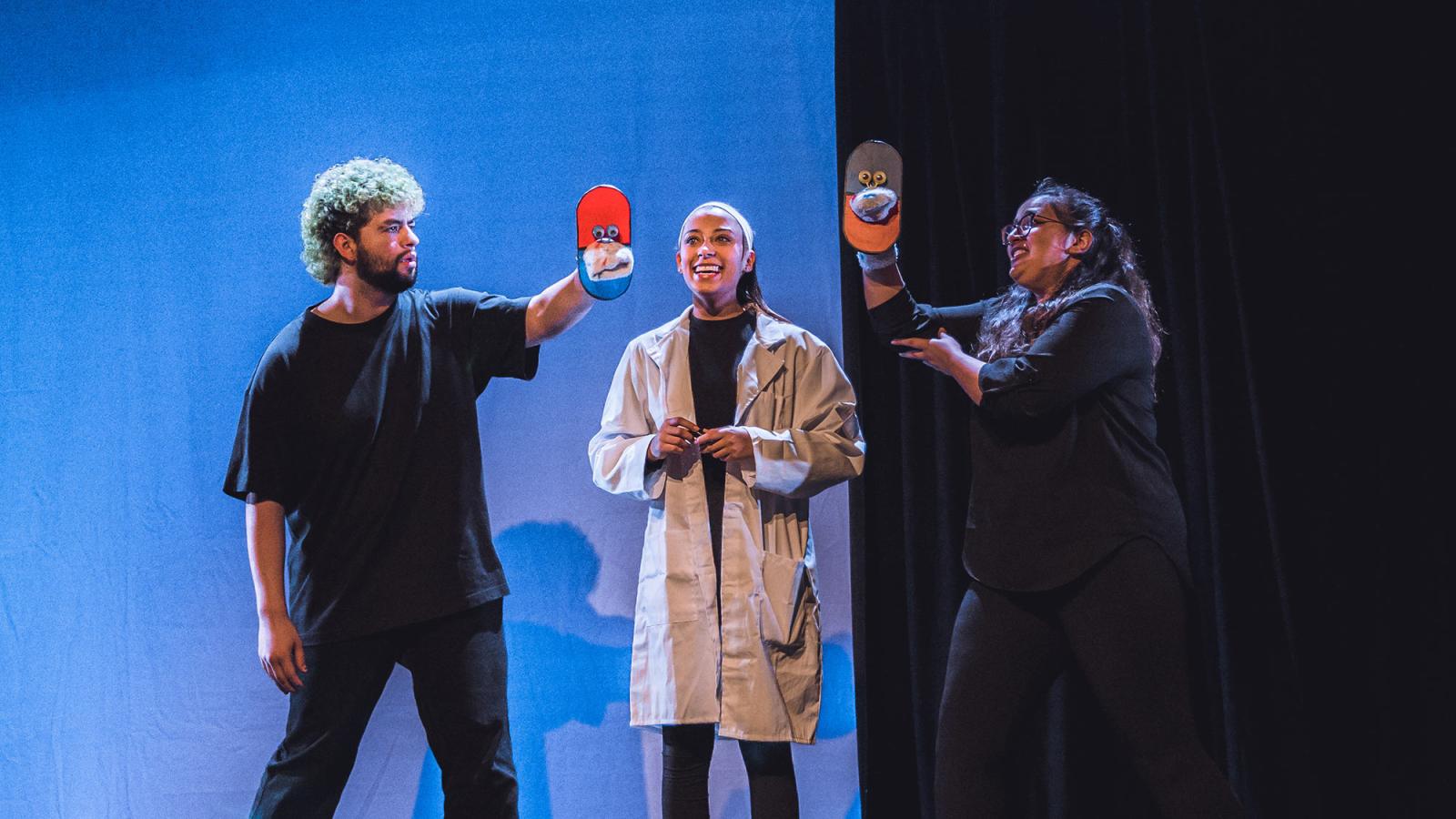
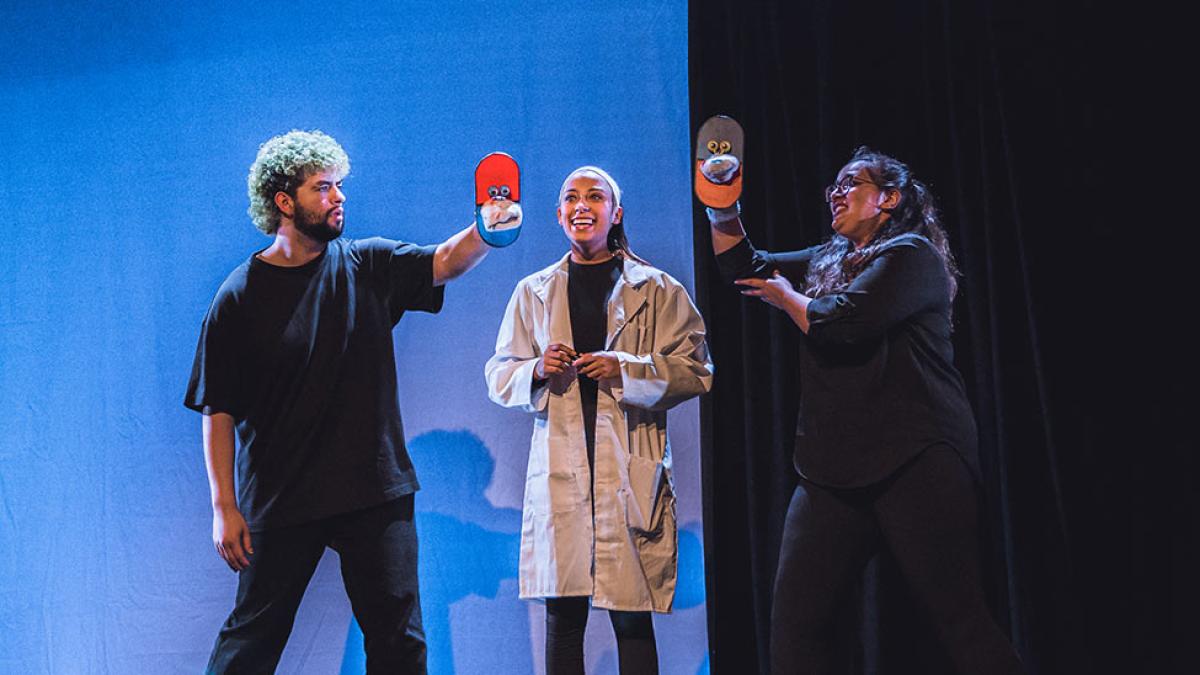
At Pace’s Sands College, a new collaboration is reshaping what access and artistry mean in music education.
This fall, Pace joins forces with Deaf West Theatre, the Tony-honored company known for bilingual productions in American Sign Language (ASL) and English, to launch an artist-in-residence program that redefines access and artistry in musical theater training.
At its center is the ASL Music Theory Lexicon Project, a first-of-its-kind initiative led by Deaf West to develop a comprehensive ASL vocabulary for music theory, making rhythm, pitch, harmony, and notation visually clear and accessible to Deaf and hard-of-hearing students.
“By engaging with Deaf West’s inclusive methods, our students are learning how access and innovation go hand in hand.”
“Sands College of Performing Arts admitted a Deaf student (and an alumnus of our stages) into their prestigious BFA in Musical Theater program for the first time,” said DJ Kurs, artistic director of Deaf West Theatre. “While this is an extraordinary moment, it also raised an urgent question for us: How could we ensure that this student—and the many Deaf artists who will follow—receive equitable access to the musical education their hearing peers take for granted? At Deaf West, we believe access is a creative asset, not a limitation.”
Collaboration in Motion
The residency immerses students in Deaf West’s inclusive performance methods through workshops and rehearsals that merge voice, sign, and movement.
“This partnership exemplifies our mission to prepare students not just for performance, but to be changemakers in the industry,” said Amanda Flynn, EdD, Pace’s musical theater program head. “By engaging with Deaf West’s inclusive methods, our students are learning how access and innovation go hand in hand.”
Supported by an endowed fund that brings visiting artists to campus, this semester’s residency features acclaimed choreographer Jennifer Weber (& Juliet, KPOP, American Idiot) and ASL choreographer Daniela Maucere, who guide students in adapting movement for visual storytelling.
“This residency represents what Sands College of Performing Arts is all about,” said Jennifer Holmes, PhD, dean of Sands College. “We’re building an ecosystem where students learn from visionary artists who are shaping the future of the field.”
Turning Language into Art
Led by Christopher Tester, Christopher Lloyd Bratten-Zappala, and DJ Kurs, the project goes beyond translation to give Deaf artists full access to music theory, not as an accommodation but as a right.
By the end of the residency, students will have gained practical experience with ASL musical staging and learned to approach access as a creative opportunity.
“As both a proud Pace Musical Theater alumnus and a child of Deaf adults, this residency is deeply personal to me,” said Jeff Perri ’12, managing director of Deaf West Theatre. “To return to my alma mater and share our process with the next generation of artists is incredibly special.”
More from Pace
What does it take to bring a classic to life? From first table read to final curtain call, follow along with the cast and crew of Chekhov’s The Seagull as they navigate an accelerated rehearsal process, build a world from scratch, and discover what it means to perform like professionals.
At Pace University, we don’t just train dancers—we train Rockettes. More Rockettes than anywhere else. As the Radio City Rockettes celebrate 100 years of precision and performance, we’re celebrating the nineteen Rockettes and fifteen ensemble dancers who got their start right here at the Sands College of Performing Arts. Their journey from Pace studios to the Radio City stage is pure magic.
The future of the arts at Pace is under construction. Inside One Pace Plaza East, Sands College of Performing Arts students and faculty are preparing to create, collaborate, and perform in spaces built for bold ideas and bright lights.
The Elisabeth Haub School of Law at Pace University Trial Advocacy Teams Excel in Villanova Sports Law Competitions
The Elisabeth Haub School of Law at Pace University Trial Advocacy Program continued its outstanding record of success this fall, earning top honors at two prestigious sports law competitions hosted by Villanova University Charles Widger School of Law. Pace Haub Law Trial Advocacy teams competed in both the Villanova Baseball Filing Day Competition and the inaugural Villanova Law Hockey Negotiation Competition. These Competitions tested students’ negotiation, advocacy, and analytical skills in simulated professional sports settings.
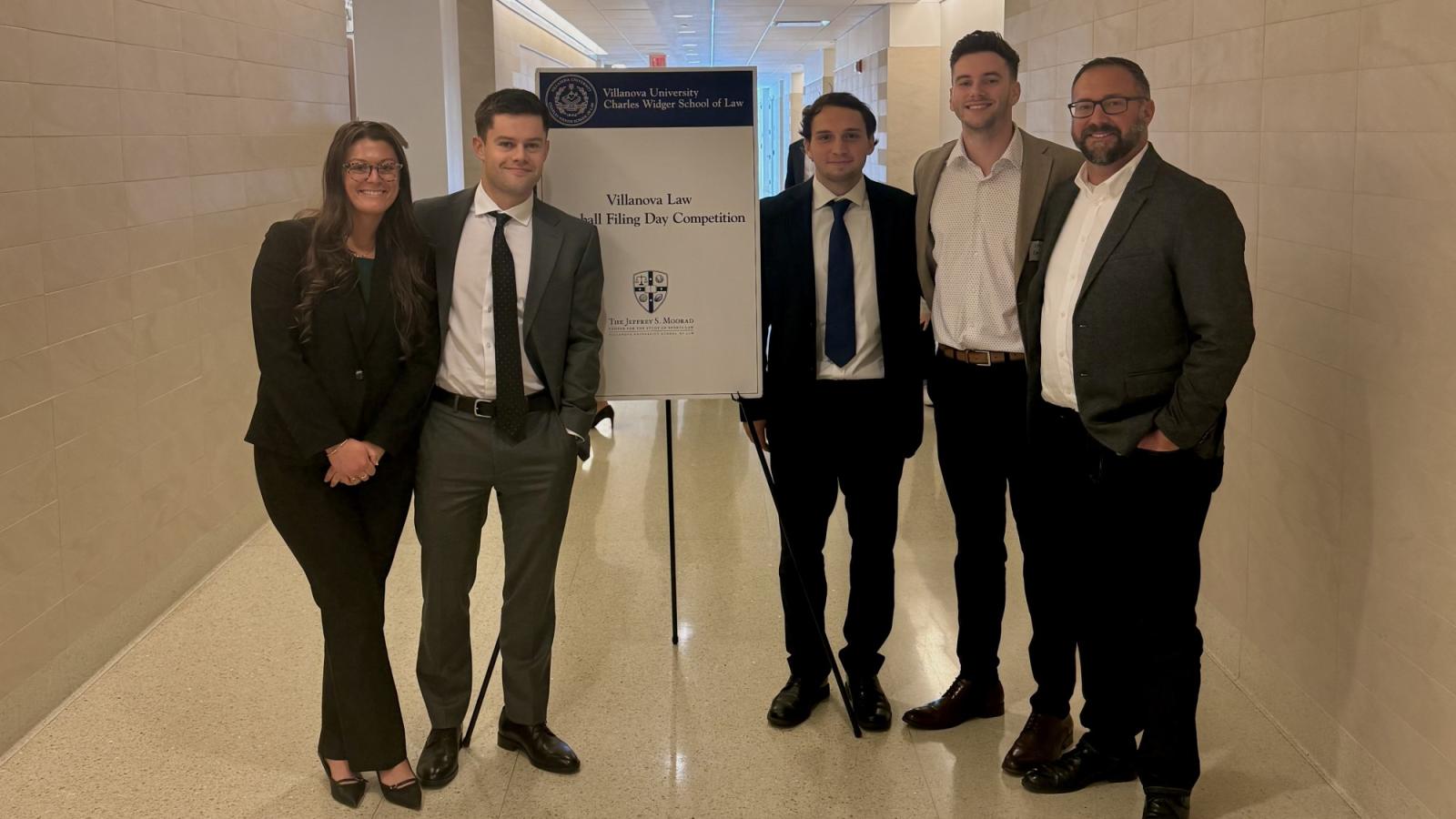
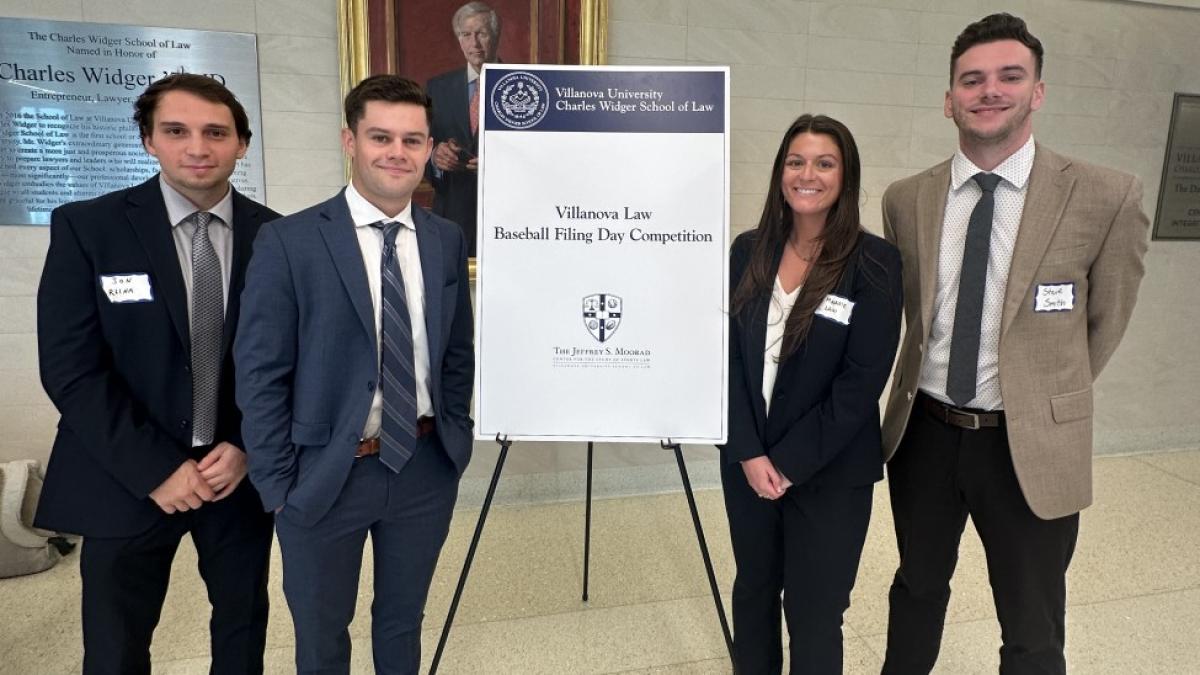
The Elisabeth Haub School of Law at Pace University Trial Advocacy Program continued its outstanding record of success this fall, earning top honors at two prestigious sports law competitions hosted by Villanova University Charles Widger School of Law. Pace Haub Law Trial Advocacy teams competed in both the Villanova Baseball Filing Day Competition and the inaugural Villanova Law Hockey Negotiation Competition. These Competitions tested students’ negotiation, advocacy, and analytical skills in simulated professional sports settings.
Pace Haub Law sent two teams to participate in this year’s Villanova Baseball Filing Day Competition, earning both a first place and a third place finish. Pace Haub Law’s team one finished in third place and consisted of Madeline Law (3L) and Stephen Smith (3L) and team two, finishing in first place, included Brendan McDonough (2L) and Jonathan Riina (2L). Both teams were coached by alumnus Dan Masi ’14, who has successfully coached the team for years and participated on the team as a Pace Haub Law student. Notably, the Pace Haub Law team also finished in first place at the 2024 Competition.
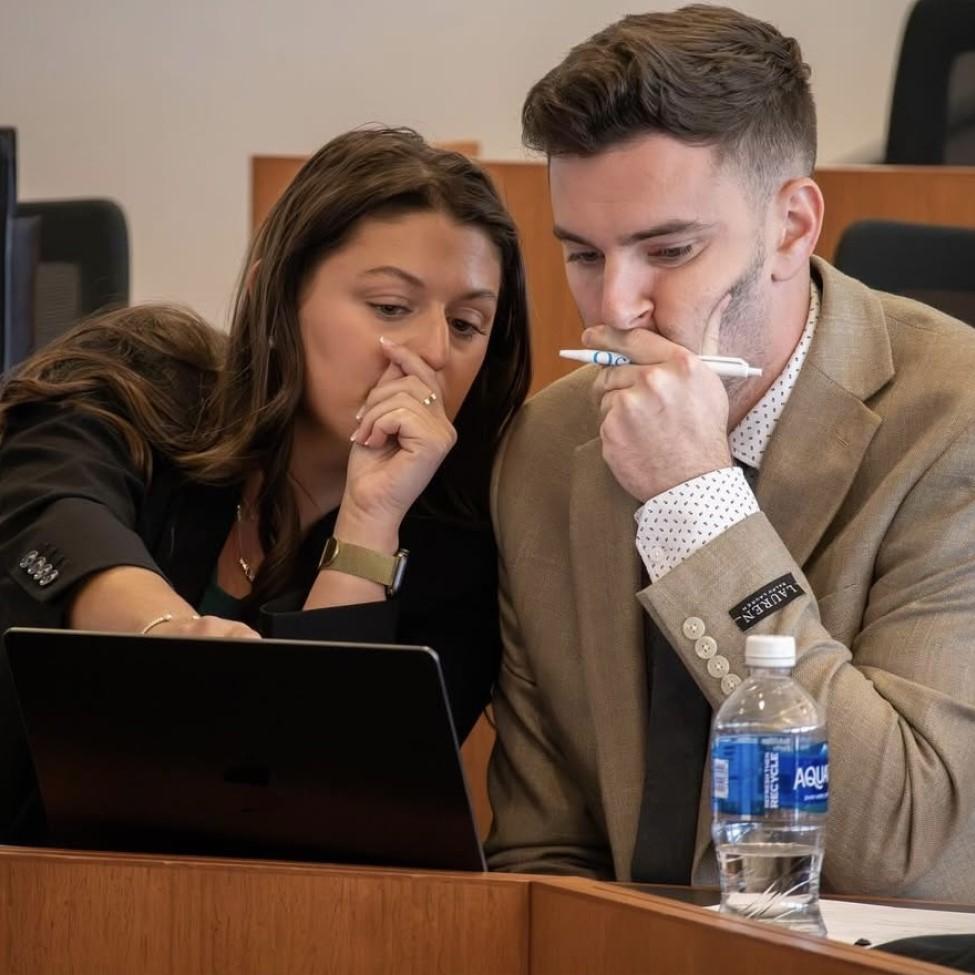
Taking place over the course of two days, the Villanova Baseball Filing Day Competition is a simulated exercise intended to mimic negotiations between MLB Players Association (MLBPA) player agents and MLB club executives before the salary arbitration Exchange Date between the MLB Labor Relations Department and the MLBPA as governed by Major League Baseball's Basic Agreement. “Both of our teams impressed judges who all have a connection to the baseball industry – ranging from player agents, team officials, practicing attorneys, and more,” said Coach Dan Masi ‘14. “Our advocacy teams have made a name for themselves in this competition and marks yet another significant achievement for our trial advocacy program. I am proud of all our competitors for showcasing their negotiation tactics ultimately resulting in a first and third place finish.”
This year marked the inaugural Villanova Law Hockey Negotiation Competition, also taking place over the course of two days. Representing Pace Haub Law were Madeline Law (3L), Brendan McDonough (2L), and Brian Maher-Gurniak (2L). The team finished in first place in this debut event under the guidance of Coach Marc Bisogno ’25, who played a large role in the success of the advocacy program during his time as a student at the Law School. “Since this is the first year that this Competition was held, we were not entirely sure what to expect,” shared team member Madeline Law (3L). “However, with the support and guidance of our team coach, Marc Bisogno ’25, we felt well prepared. We worked as a team over the course of the last couple of months to prepare for many competition scenarios.”
“Our team demonstrated exceptional teamwork, creativity, and professionalism in navigating complex multi-party negotiations,” said Coach Marc Bisogno ‘25. “I am proud of their dedication and ability to successfully strategize and ultimately win this inaugural competition.” During the Villanova Hockey Negotiation Competition, participants tackled a series of real-world inspired negotiation challenges that commonly occur throughout the sports industry, ranging from front office partnerships to player-focused advocacy. Participants’ oral advocacy and negotiation skills were challenged in a series of prompts that will range from host-city to stadium naming rights negotiations. Winners were selected by judges from the hockey industry, including player agents, team officials, and attorneys regularly working in the space.
“These remarkable results underscore the strength of Pace Haub Law’s advocacy curriculum and the dedication of its students and alumni coaches,” said Director of Advocacy Programs and Professor of Trial Practice Louis Fasulo. “Through simulated real-world experiences like these, Pace Haub Law students refine their ability to think critically, communicate persuasively, and negotiate effectively, which are all skills that will serve them throughout their legal careers.”
Through simulated real-world experiences like these, Pace Haub Law students refine their ability to think critically, communicate persuasively, and negotiate effectively, which are all skills that will serve them throughout their legal careers.
—Louis Fasulo, Director of Advocacy Programs and Professor of Trial Practice
In addition to competing throughout the year, students in the Trial Advocacy Program also take on key leadership roles within the organization. This year, Madeline Law (3L) serves as the Alternative Dispute Resolution (ADR) Director for the Pace Haub Law Advocacy Program, a position previously held by her coach in the Villanova Law Hockey Negotiation Competition, Marc Bisogno ’25. As ADR Director, Madeline oversees the ADR branch of the Advocacy Program, supporting student teams as they prepare for competitions. “I feel fortunate to serve in this role,” she shared. “As Director, I regularly check in with team members to provide resources, advice, and support, ensuring that every student has the tools needed to succeed. Directors also help manage team dynamics and logistics, from registering for competitions to facilitating communication with other schools.”
Madeline notes that serving as Director has deepened her understanding of what goes into each competition. “Empowering students to serve in these executive roles,” she added, “is one of the many ways Pace Haub Law’s Trial Advocacy Program prepares its students to graduate confident, capable, and ready to practice.”
January Intersession: Earn 4 Credits in 4 Weeks
Pace’s January Intersession lets you knock out up to four credits in just four weeks—most of it fully online and on your own schedule. Lighten your spring load, stay on track to graduate on time (or early, if you’re an overachiever), and even try something totally new. Cozy vibes and academic progress? Yes, please.
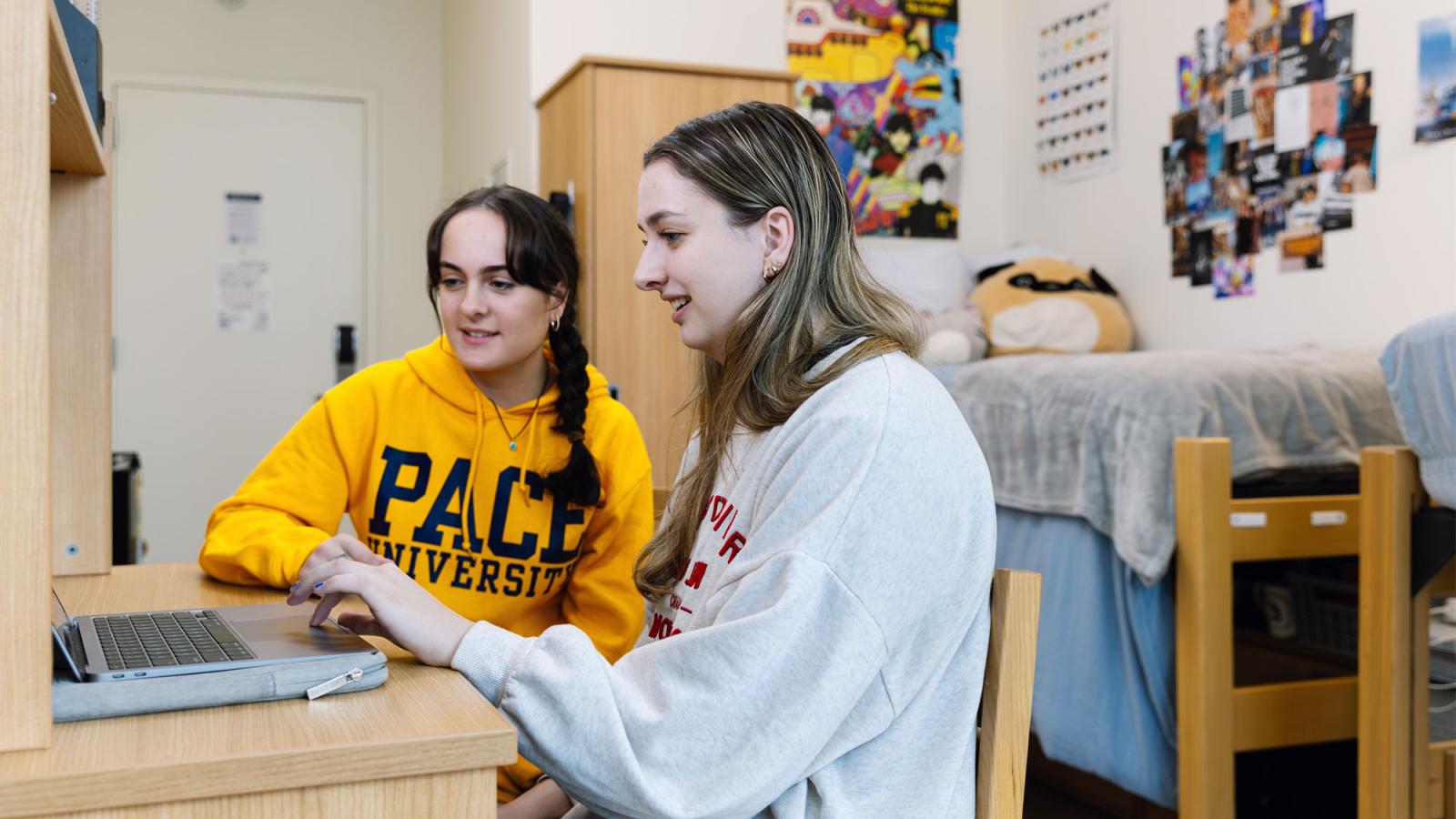
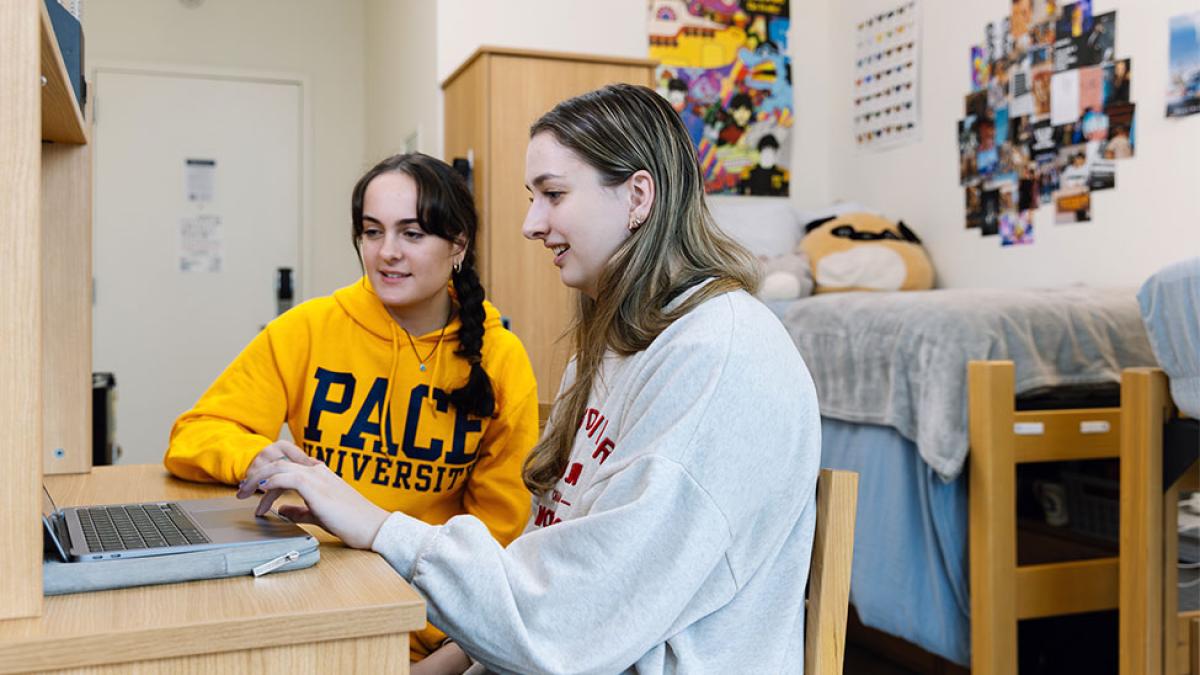
January Intersession is a quick, four-week mini–semester that lands right between fall and spring. It’s your chance to earn credits over winter break—most of it fully online and on your own schedule—so you can keep your momentum going without giving up your cozy-season vibes.
And the best part? You can use this time to explore classes you might not normally have room for. Think Digital Design, Creative Writing, American Sign Language, Psychology of Cultural Diversity, Meteorology, or even Cinema Auteurs of New York City. Want something more foundational? Try Intro to Psychology, World Civilization, or Microeconomics. Looking to get ahead in your major? There are options in Criminal Justice, Communication, Art History, and even Organizational Development and Human Learning for graduate students.
- Registration opened: October 27, 2025
- Classes begin: January 5, 2026
- In-person and hybrid courses wrap: January 17, 2026
- Fully online courses wrap: January 31, 2026
Register for January Intersession
No matter what you choose, January Intersession helps you lighten your spring load, stay on track to graduate on time (or early), and dip into subjects you’re genuinely excited about. It’s flexible, low-pressure, and built to give you a little extra breathing room—academically and in life. Cozy vibes + real progress = a win.
More from Pace
Questions about registration, financial aid, or student accounts? The Pop-Up Student Solutions Centers are your go-to resource as we head into the Spring 2026 semester. No appointments, no stress—just the answers you need to keep moving forward.
Pace President Marvin Krislov pens an op-ed in Newsday about the importance of filing the FAFSA early and not letting uncertainty delay opportunity. Drawing on his leadership at a university committed to access and affordability, President Krislov emphasizes how timely financial aid guidance can help families plan for college success.
Is a master’s in computer science worth it? Explore career paths, earning potential, and how Pace’s programs can boost your tech career.
Should You Get a Master’s in Computer Science? Reasons to Consider
Is a master’s in computer science worth it? Explore career paths, earning potential, and how Pace’s programs can boost your tech career.


A master’s degree in computer science can open doors to career advancement, increased earning potential, and expertise in cutting-edge technologies. But is it the right choice for you? This article explores the top reasons to consider earning an MS in computer science, along with key factors to evaluate when deciding if it aligns with your professional goals.
What Is a Master’s Degree in Computer Science?
A master’s in computer science goes beyond coding. It’s an in-depth exploration of advanced algorithms, machine learning, data systems, cybersecurity, and emerging technologies that shape the digital world.
Where a bachelor’s provides a solid foundation, a master’s pushes you into specialized, high-impact problem solving, the kind that drives innovation and leadership.
With this degree, you’re not only staying ahead of the curve with the tech industry, you’re setting the pace. Employers look to master’s-level talent to lead projects, design complex systems, and set strategic direction in a rapidly changing field. If you want to compete and win in today’s tech sector, a master’s in computer science positions you to do exactly that.
Is a Master’s in Computer Science Worth It?
Deciding whether to pursue a master’s in computer science comes down to one question: is it worth the career and financial investment? Here’s a closer look at what a master’s in computer science can do for your salary, career growth, skills, and the programs that set you up for success.
1. Boost Your Salary
Graduates with an MS in computer science earn notably more than those with just a bachelor’s — about 17% more in career earnings. According to PayScale, higher degree earners make an average base salary of $114,000 annually, while colleagues with a bachelor’s earn around $98,000, on average.
2. Climb the Career Ladder
A master’s degree in computer science signals readiness for senior and managerial tech roles that require advanced thinking, collaboration, and strategic vision. Fields such AI, machine learning, cybersecurity, data science, and cloud engineering increasingly favor candidates with graduate-level expertise. These positions often come with additional perks, such as more competitive salaries and benefits.
3. Stay Competitive in a Top Market
AI has had a dramatic impact on the tech job market, leading to fewer entry-level openings, more automated screening, and tools that take on junior-level work. A master’s in computer science, built around in-demand skills, keeps you competitive because big-picture thinking and deep technical expertise can’t be automated. But the degree works best when paired with certifications and real-world project experience.
4. Stack Your Skills
In fast-moving tech fields, employers want proof you can do the work, sometimes valuing AI and industry-specific skills as much as a degree. Pairing your master’s with targeted certifications, such as AI or machine learning credentials, can give you a clear advantage and open doors to high-demand roles.
5. Choose a Program that Fits
Pace’s MS in Computer Science focuses on today’s most in-demand technology, including AI, machine learning, and cloud computing, so you gain skills that matter. The program also connects you with employers and real-world opportunities, helping graduates step directly into roles where they can lead and innovate.
What Career Paths Can You Pursue with a Master’s in Computer Science?
Earning a master’s in computer science opens the door to some of the tech industry’s most in-demand roles. These jobs pay well and put you at the cutting edge of innovation. Here’s a look at top career paths for MS grads, including what you’ll do, the skills you need, and what you can earn.
Salary information was compiled from Glassdoor, reflecting the most recent data available as of 2025 for salaries in the New York Metro area.
Data Scientist
- Job Description: Analyze complex datasets to extract actionable insights and guide business decisions
- Important Skills: Proficiency in Python, R, SQL; expertise in machine learning and statistical analysis
- Average Salary Range: $125,000–$213,000
Software Engineer
- Job Description: Design, develop, and maintain software applications across various platforms
- Important Skills: Strong knowledge of programming languages such as Java, C++, and Python; problem-solving and debugging abilities
- Average Salary Range: $130,000–$211,000
AI Researcher
- Job Description: Conduct advanced research to develop new AI models and algorithms to ethically improve AI capabilities
- Important Skills: Deep understanding of machine learning, neural networks, and AI theory; proficiency in programming languages such as Python and TensorFlow
- Average Salary Range: $98,000–$180,000
Cybersecurity Analyst
- Job Description: Protect an organization's computer systems and networks from cyber threats by implementing security measures and responding to incidents in real time
- Important Skills: Knowledge of network security protocols, risk management, and familiarity with tools, including firewalls and intrusion detection
- Average Salary Range: $101,000–$176,000
Cloud Solutions Architect
- Job Description: Design and implement scalable cloud infrastructure solutions and ensure they meet the latest business needs and security standards
- Important Skills: Expertise in cloud platforms (AWS, Azure, or Google Cloud); strong architectural design and problem-solving skills
- Average Salary Range: $189,000–$309,000
Machine Learning Engineer
- Job Description: Develop and deploy machine learning models that enable systems to learn and make predictions from data
- Important Skills: Deep understanding of data processing and machine learning frameworks, such as TensorFlow and PyTorch
- Average Salary Range: $135,000–$217,000
DevOps Engineer
- Job Description: Bridge the gap between software development and IT operations, automating processes to enhance system reliability and efficiency
- Important Skills: Familiarity with automated software pipelines, scripting languages, and cloud infrastructure
- Average Salary Range: $25,000–$198,000
Blockchain Developer
- Job Description: Build and manage applications that run on blockchain networks and write programs that automatically execute agreements
- Important Skills: Proficiency in blockchain platforms, knowledge of cryptography and smart contract development
- Average Salary Range: $124,000–$201,000
Big Data Engineer
- Job Description: Design and manage large-scale data processing systems to enable organizations to analyze vast amounts of data efficiently
- Important Skills: Expertise in big data technologies and databases; strong programming skills
- Average Salary Range: $130,000–$208,000
4 Factors to Consider Before Enrolling in a Computer Science Master’s Program
Pursuing a master’s in computer science is a big decision. It’s a time, energy, and financial commitment, so you want to be sure it lines up with your personal circumstances and professional goals. Here’s what to weigh before you enroll:
1. Tuition and Financial Considerations
Master’s programs can be a significant investment. Tuition varies by school, and costs can add up quickly, but financial aid, scholarships, and employer-sponsored funding options can offset the price. Beyond cost, think about the return on investment: Graduates typically see higher earning potential and more leadership opportunities over time, which can more than justify the upfront expense.
2. Time Commitment
Most MS programs take 18 months to 3 years, depending on whether you enroll full-time or part-time. Juggling work, studies, and personal responsibilities is no small feat, so it’s important to plan ahead. Full-time students navigate their academic journey faster, often requiring a pause of other commitments. Part-time programs allow students to continue working but extend the timeline to graduation. Understanding your own schedule and energy levels is key to succeeding without burning out.
3. Delivery Format Options
Pace offers online, in-person, and hybrid programs, so you can choose the format that fits your learning style and career goals. Online programs let you study from anywhere, which is ideal if you’re balancing work or family. In-person programs maximize networking and hands-on collaboration, while hybrid programs give you the flexibility of online learning without missing out on face-to-face opportunities. Think about which format will keep you motivated and connected throughout your degree.
4. Alternative Career Development Paths
A master’s isn’t the only way to boost your tech career. Certifications such as AWS Certified Solutions Architect or Certified Ethical Hacker provide targeted skills that employers value. Short-term bootcamps in areas such as data science, cybersecurity, or software engineering can also accelerate skill-building at a lower cost and shorter timeframe. Compare the costs, outcomes, and career benefits of certifications, bootcamps, and a full MS program to find the approach that works best for your goals.
Your Next Career Move
A master’s in computer science is a strategic move for your career and your future earning potential. If you’re ready to level up, programs such as Pace University’s MS in Computer Science or PhD in Computer Science give you the skills, connections, and opportunities to get there.
Take the next step today and request information to see how Pace can help you reach your goals.
Press Release: Pace University Art Gallery Presents Nuclear Injustice: Advocating for a Nuclear-Free Future
Pace University Art Gallery is pleased to present Nuclear Injustice, a group exhibition of work by Kathy Jetñil-Kijiner, Alan Nakagawa, Michael Wang, and Will Wilson that examines the lasting consequences of nuclear testing and bombings. The exhibition opens to the public on Saturday, November 15, with a free public reception and walkthrough on Tuesday, November 18, from 5:00 p.m. to 7:00 p.m. It will remain on view through January 31, 2026.
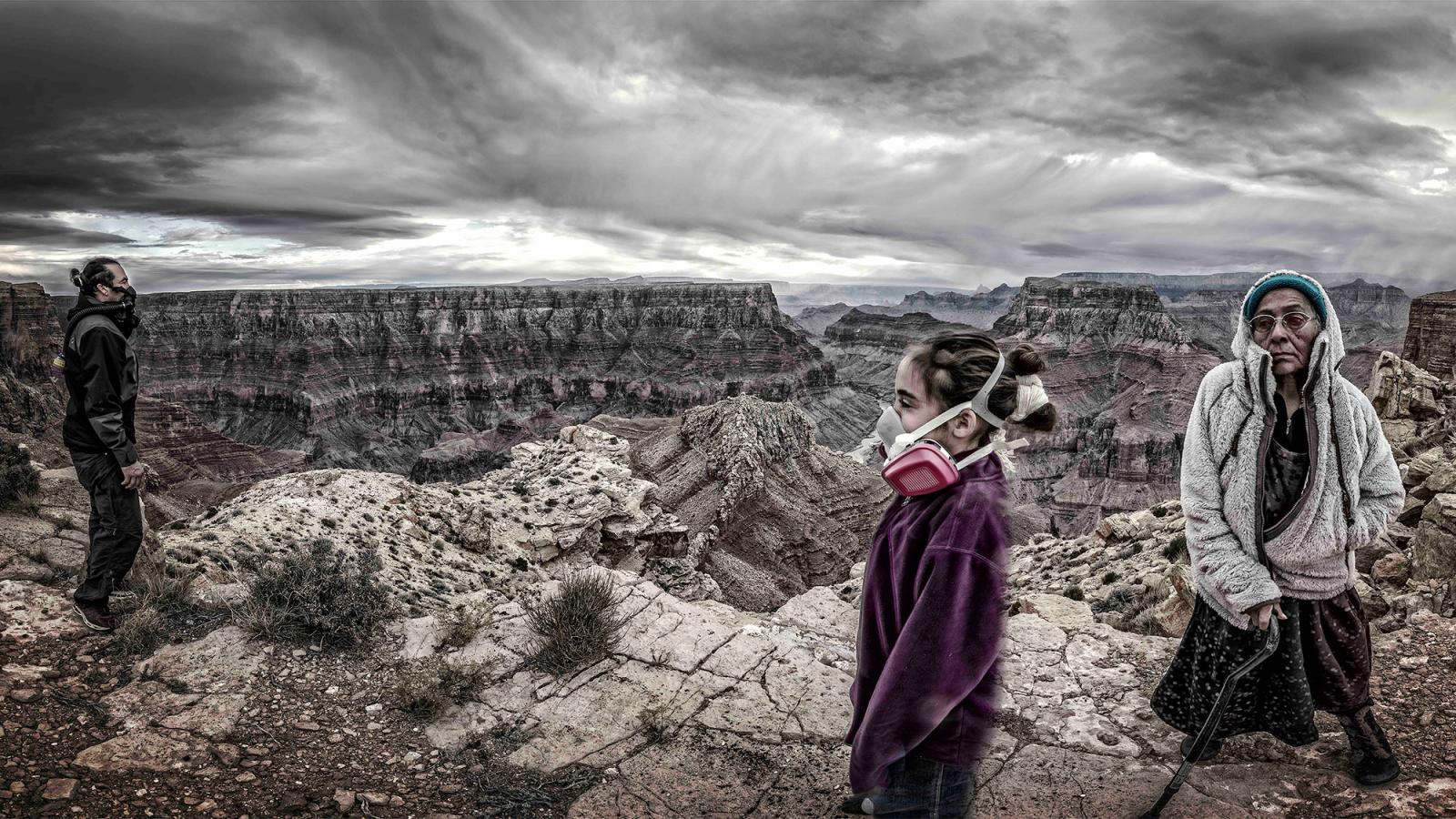

Featuring powerful artistic responses to nuclear history and its ongoing global impact
Pace University Art Gallery is pleased to present Nuclear Injustice, a group exhibition of work by Kathy Jetñil-Kijiner, Alan Nakagawa, Michael Wang, and Will Wilson that examines the lasting consequences of nuclear testing and bombings. The exhibition opens to the public on Saturday, November 15, with a free public reception and walkthrough on Tuesday, November 18, from 5:00 p.m. to 7:00 p.m. It will remain on view through January 31, 2026.
Through powerful artistic responses—including photography, sound installation, video poetry, and sculpture—the artists explore radioactive landscapes, Indigenous resistance to nuclear colonialism, and global movements advocating for a nuclear-free future.
Curated by Sarah Cunningham, professor of art and gallery director, and Joel Wilson ’27, the Amelia A. Gould Undergraduate Research Assistant in the Creative Arts, in collaboration with Emily Welty, PhD, chair of Peace and Justice Studies, the exhibition investigates the political, personal, and physical impacts of nuclear weaponry. It traces these effects from the poisoned soil and military sites of the Marshall Islands and the American Southwest to the soundscapes of Hiroshima and the lingering, often invisible infrastructures of energy and contamination that persist today.
“Nuclear weapons are not inevitable,” said Welty, who is also a member of the International Campaign to Abolish Nuclear Weapons (ICAN). “Like any oppressive social construction, they were created by human beings—and can be dismantled by human beings who are fueled by the courage and determination not to settle for a world with nuclear weapons.”
The artists in the exhibition powerfully draw our attention to the aftereffects of the atomic era, transforming sites of devastation into spaces for remembrance, renewal, and resistance.
Marshallese poet and activist Kathy Jetñil-Kijiner presents video poems that reflect on the destructive impact of nuclear testing in the Marshall Islands and the deep interconnections between culture, memory, and place. Alan Nakagawa, a Los Angeles–based artist, uses field recordings from the Hiroshima Atomic Dome and the Wendover Hangar—from which the Enola Gay bomber departed—to create an immersive sound installation that transforms the reverberations of violence into a space for collective reflection. Will Wilson, a Diné photographer, contributes images which confront the ongoing environmental fallout of uranium mining on Indigenous lands, linking nuclear extraction to broader systems of colonial exploitation. Michael Wang, a conceptual artist based in New York, explores the scientific, moral, and ecological tensions of nuclear containment and exposure, situating these concerns within the lineage of land art.
The Nuclear Injustice exhibition is made possible by the New York State Council on the Arts with the support of the Office of the Governor and the New York State Legislature. Additional funding was received from the Mellon Foundation and the Center for Undergraduate Research at Pace University. The gallery is located in Lower Manhattan at 41 Park Row. All the gallery’s exhibits and events are free and open to the public.
About the Artists
Kathy Jetñil-Kijiner is a Marshallese poet, filmmaker, and climate justice advocate whose work centers on the legacy of nuclear testing in the Marshall Islands. Her interdisciplinary practice brings together film-poetry, performance, and spoken word to shed light on cultural disruption, environmental injustice, and the resilience of Island communities. Her practice is informed by her ongoing community engagement through Jo-Jikum, the Marshall Islands–based nonprofit she co-founded in 2012 to support youth empowerment and environmental advocacy. In concert with her artistic and activist work, she is Climate Envoy for the Marshall Islands’ Ministry of Environment, completing her Ph.D. in Pacific Studies at the Australian National University and the author of Iep Jaltok: Poems from a Marshallese Daughter (university of Arizona Press, 2017).
Alan Nakagawa is a Los Angeles-based interdisciplinary artist with archiving tendencies, primarily working with sound, often incorporating various media and working with communities and their histories. He has created a series of Invisible Architecture experiences that are mash ups of the recorded acoustics of historical sites, giving new context to historic places through a contemporary lens of sound. Nakagawa is a recipient of two Art Matters grants, City of Los Angeles Artist Fellowship, California Community Foundation Mid-Career Artist Fellowship and a Monbusho Scholar. He co-founded arts collective non-profit Collage Ensemble Inc. (1984–2011), curated experimental music weekly Ear Meal Webcast (2010–2017), produced public practice artist interviews podcast VISITINGS Radio Show (2017–2020) and administers the website Asian American Futurism (2022–Present). His first book, A.I.R.Head: Anatomy of an Artist in Residence (Writ-Large Press, 2023) maps his artistic trajectory that led to nine artist-in-residencies in six years.
Michael Wang lives and works in New York. He uses systems that operate at both a local and global scale as media for art: climate change, species distribution, resource allocation, and the global economy. Select solo exhibitions include Bienvenu Steinberg & C, New York, NY (2024), Lake Tai, Prada Rong Zhai, Shanghai (2022); Extinct in New York, LMCC Arts Center, Governors Island, NY (2019). Selected group exhibitions include Meta City Biennale, Shanghai (2023); Solastalgia, Kalmar Art Museum, Sweden (2023); The 13th Shanghai Biennale, Shanghai (2021); Elevation 1049, 'Interstices,' Gstaad, Switzerland (2023); Vulnerable Critters, La Casa Encendida, Madrid (2022); Manifesta 12: The Planetary Garden, Palermo, Italy (2018); Parcours, Art Basel, Switzerland (2016). In 2017, he was a recipient of the Joan Mitchell Foundation Painters & Sculptors Grant.
Will Wilson is a Diné photographer and trans-customary artist who spent his formative years living on the Navajo Nation. His work is an allegorical investigation of the extraordinarily rapid transformation of Indigenous lifeways, the dis-ease it has caused, and strategies of response that enable cultural survival. Wilson studied photography, sculpture, and art history at the University of New Mexico (MFA) and Oberlin College (BA). Wilson has won the Native American Fine Art Fellowship from the Eiteljorg Museum (2007), the Joan Mitchell Foundation Award for Sculpture (2010), the Pollock-Krasner Foundation Grant for Photography (2016), the New Mexico Governor's Award for Excellence in the Arts (2017), and the Doran Artist in Residence at the Yale University Art Gallery (2020). His work is exhibited and collected internationally. Wilson has held visiting professorships at the Institute of American Indian Arts, Oberlin College, and the University of Arizona. He is currently an Associate Professor in the Department of Studio Art at the University of Texas at Austin.
About the Pace University Art Gallery
Founded with the conviction that art is integral to society, the Pace University Art Gallery is a creative laboratory and exhibition space that supports innovation and exploration for both artists and viewers. Open to students, staff, and faculty from across the Pace campuses and, equally, to the Lower Manhattan community and visitors from around the world, the Art Gallery encourages personal investigation and critical dialogue via thought-provoking contemporary art exhibits and public programming. Enhancing the Art Department’s Bachelor of Arts and Bachelor of Fine Arts programs, the Art Gallery offers students real-world opportunities to exhibit their own art and to work directly with professional artists to install and promote exhibitions. All exhibits and events are free and open to the public.
About Dyson College of Arts and Science
Pace University’s liberal arts college, Dyson College, offers more than 50 programs, spanning the arts and humanities, natural sciences, social sciences, and pre-professional programs (including pre-medicine, pre-veterinary, and pre-law), as well as many courses that fulfill core curriculum requirements. The College offers access to numerous opportunities for internships, cooperative education and other hands-on learning experiences that complement in-class learning in preparing graduates for career and graduate/professional education choices.
About Pace University
Since 1906, Pace University has been transforming the lives of its diverse students—academically, professionally, and socioeconomically. With campuses in New York City and Westchester County, Pace offers bachelor, master, and doctoral degree programs to 13,600 students in its College of Health Professions, Dyson College of Arts and Sciences, Elisabeth Haub School of Law, Lubin School of Business, Sands College of Performing Arts, School of Education, and Seidenberg School of Computer Science and Information Systems.
High-Kicking Radio City Rockettes Mark 100 Years With Christmas Spectacular
The Associated Press celebrates the 100th anniversary of the Radio City Rockettes, highlighting Pace’s pivotal role in shaping the iconic troupe. The story features Lauren Gaul, chair of Pace’s Commercial Dance program and a former Rockette, reflecting on the rare joy of dancers taking center stage. Pace proudly celebrates nineteen Rockettes and fifteen ensemble dancers performing in this year’s Christmas Spectacular—more than any other university. It’s a dazzling testament to the world-class training and mentorship of the Sands College of Performing Arts, where precision, artistry, and professionalism begin long before the curtain rises.
Voting Guide: Election Day 2025 Candidates, Key Issues And More
Dyson Political Science Professor Laura Tamman appeared on ABC7NY’s “The Countdown” to help break down ballot questions ahead of Election Day.
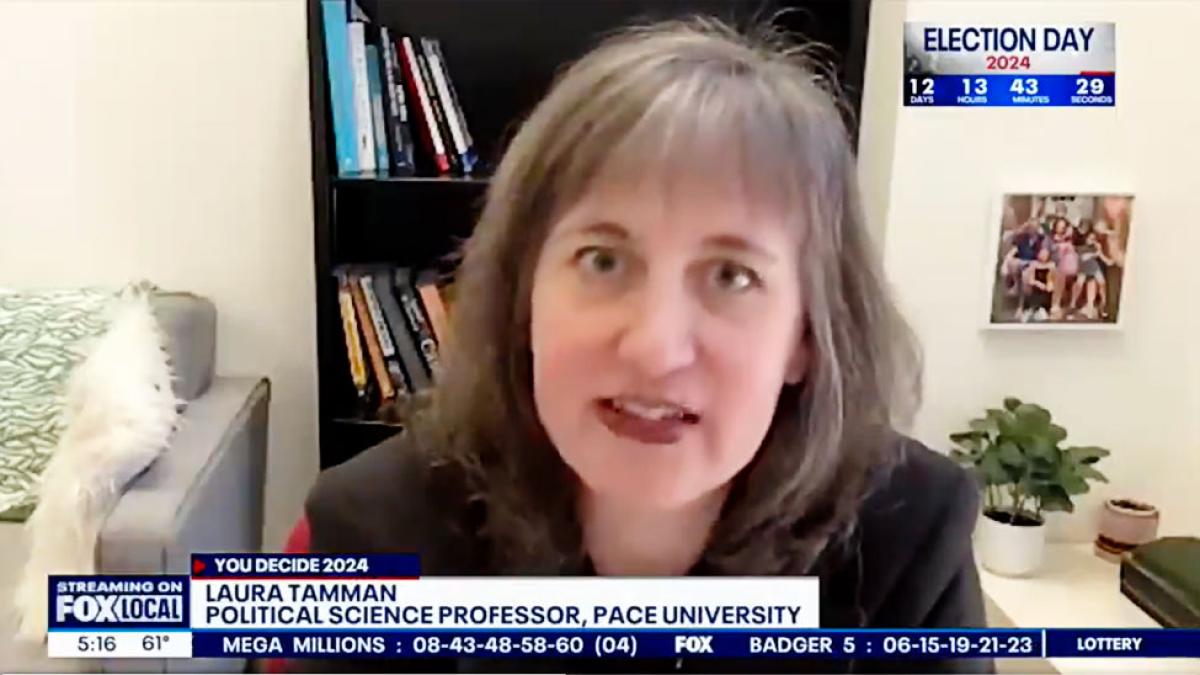
Vindictive Prosecution Defense Gains Traction Against Trump DOJ In Three Cases
In The Washington Times, Professor Gershman comments on the surge of vindictive prosecution claims against the Justice Department, offering his trademark candor on prosecutorial ethics and accountability.
